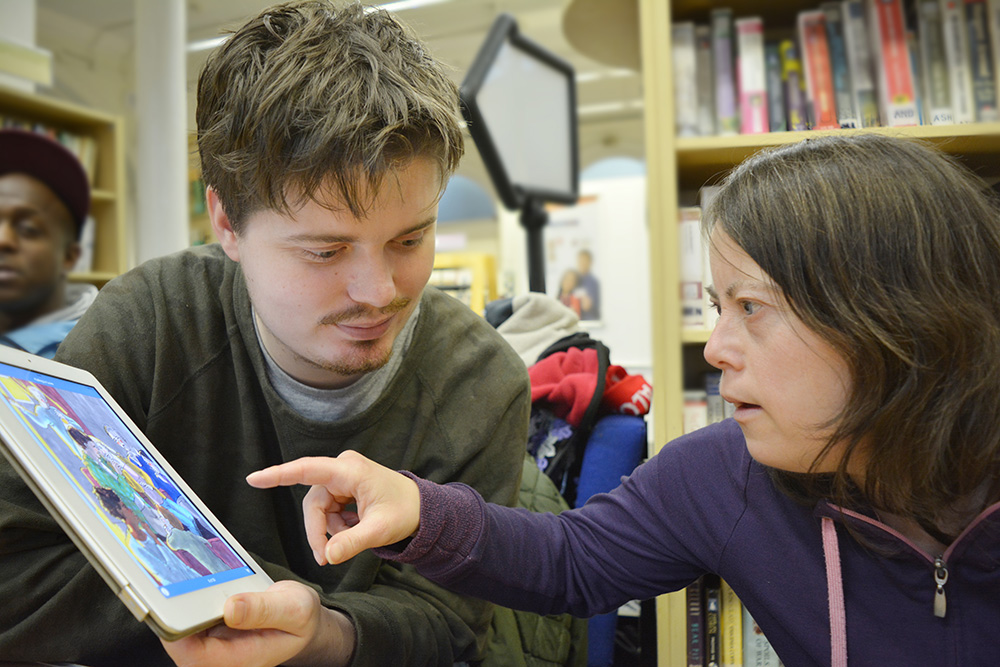A picture paints a thousand words

Our Belong partner, Beyond Words, is helping people with a learning disability and autism better understand COVID-19 by creating wordless picture stories that explain lockdown, social distancing and end-of-life.
The books are all free to read and download from the Beyond Words website. The pictures are also available in the free BW Story App. As of early May 2020, the resources have been accessed more than 7,000 times while copies have also been shared with young people in the Friends Old and New project, supported through a £70,000 grant from our #iwill Fund.
Friends Old and New helps young people with a learning disability run book clubs where they can build skills, grow their understanding of relationships and discuss loneliness with their peers.
More than a picture
Professor Sheila the Baroness Hollins launched the Beyond Words series in 1989, inspired by her research as Professor of Psychiatry and Disability at St George’s Hospital Medical School and her experiences with her own son who has a learning disability and autism.
Many young people with a learning disability or communication difficulty find it hard to read or don’t like written words. Beyond Words co-creates specially crafted picture stories to overcome this.
Lucy Alexander, Friends Old and New Project Manager, said: “Our picture stories cover a range of situations that we all experience but that people with a learning disability may find more difficult to understand. People who can’t read or who don’t like written words are often very good at reading pictures instead and this is a ‘way in’ to help them understand issues and prompt discussions about their own experiences.”
Friends Old and New
Our funded project supports young people with a learning disability to run book clubs for their peers sharing Beyond Words stories. Clubs begin in schools before moving into the community, offering a resource for local people and a chance for participants to build their own skills and relationships.
The books accessed also prompt the young people who take part to discuss loneliness and learn more about themselves.
Lucy said: “Everyone reads our books differently and that tells us a lot about them as a person. Within a school setting, this can help staff and project facilitators better understand those who take part, while it also gives young people the chance to talk more openly about their lives and experiences.
“Transition is really hard because when a young person with a learning disability leaves school their contacts and friends can be lost. The book clubs provide a ready-made social activity that helps build relationships and supports the community.”
The impact of COVID-19
Lockdown has meant some of Beyond Words’ book clubs have paused. This has, however, afforded the team more time to work on resources that will help young people and adults with a learning disability to better understand COVID-19 and its impact.
Work started with ‘Beating the Virus’ – a wordless story that shows a person who gets COVID-19 symptoms and recovers. Other resources look in depth at end-of-life and mental health.
Lucy said: “The pandemic is a really difficult time for people with a learning disability. They’ve been told to stay indoors but many are finding it hard to grasp what’s going on.
“We created our wordless stories to help tackle that. It can be hard to articulate your fears, but these books help those conversations to start.”
About the #iwill Fund
The #iwill Fund is a £40 million joint investment from the National Lottery Community Fund, using National Lottery funding, and the Department for Digital, Culture, Media and Sport (DCMS) to support young people to access high quality social action opportunities. We act as a match funder.
The #iwill Fund supports the aims of the #iwill Campaign that wants to make social action a part of life for as many 10 to 20-year-olds as possible.
We’ll be supporting organisations that help young people through bereavement through our #iwill Fund from 2020. Other #iwill Fund grants will see us help young people make community spaces more accessible and help them support each other as they move up schools. Follow our blog for updates.
